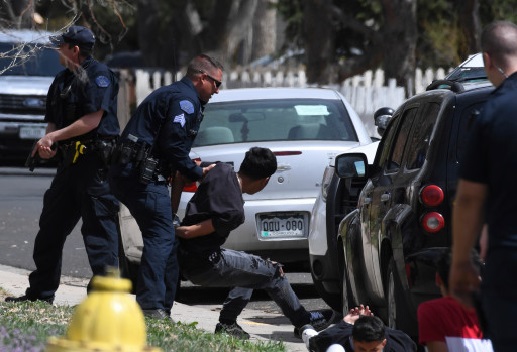

By Sgt. Betsy Brantner Smith (ret.)
I was a cop for 29 years, a police dispatcher before that, and I’ve been a police trainer for decades. Every morning I receive a summary of police officer-related news in my email inbox. From officer-involved shootings, vehicle crashes and use of force editorials to lawsuits, protests and ambushes, I devour it all. And like many of you, I continue to feel frustrated as I read about the daily assault on American law enforcement. Most days, I’m on the phone or exchanging emails and texts with other trainers or with officers on the street, talking about individual cases as well as “officer safety” in general, and the conversation always seems to circle back to the same thing: “Basics.” We tend to forget the basics when it comes to police officer safety, and that can get us hurt.
If you’re a cop, you may be thinking to yourself “I’m no rookie, I don’t need another article on the basics of officer safety.” Think again. It’s rarely the rookies who get hurt and killed, it’s the veterans. Remember, the average age of an officer killed in the line of duty is about forty, with about 18 years on the job. Before you scroll past the rest of this article, look in the mirror. How did your last shift go? Your last arrest? Your last search? Did you make any mistakes? Did you see anyone else make mistakes? We’re not only responsible for our own safety, we are tactically and morally obligated to watch out for our brothers and sisters, and that includes making sure we’re all performing at our absolute best. Not to be dramatic, but it can be the difference between life and death.
Here are some of things we need to improve upon, immediately. See if any of this applies to you or someone you know.
We’re in a hurry. Whether it’s a suspicious circumstances call, a domestic dispute, a warrant service, a cell search, or a traffic stop we seem to be in a hurry. Sometimes that’s appropriate, but very often it’s not. Are you thinking about what’s ahead? Are you visualizing what may happen in the next five seconds, the next ten minutes, the next hour, and how you’re going to respond? We call that a “When/Then” mindset, and it’s essential to your safety and the safety of those around you. Slowing things down a tiny bit is not the same as “hesitation.” Be deliberate in your response, take the time to observe, be confident in your tactics. Breathe, focus, anticipate, WIN.
We’re not taking control. About 50,000 cops are assaulted every year in the United States. Gunfire deaths and officer ambushes are on the rise, but so are physical assaults. Social media and smart phones are emboldening thugs to attack law enforcement officers with buckets of water, cartons of food and just about anything else you can imagine. These are assaults, not harmless pranks. Talk with your coworkers about how you plan to respond in these situations, and talk to your supervisor. Discuss various scenarios and your response to them. And never forget that even after you’ve made an arrest and handcuffed your suspect, it doesn’t mean you’re “safe.” American cops have been assaulted and even shot and killed by handcuffed, “unarmed” subjects. We must get and keep our suspects controlled, make sure they are thoroughly searched, and watch for any indication that an attack may be coming.
We’re not mentally prepared. Have you truly prepared yourself mentally as well as tactically and physically to win a gun fight or an assault? Making force decisions requires as much mental preparation as it does tactical. We also have to be prepared for the immediate aftermath. Have you thought about how you’ll respond if you’re shot? As my husband Dave “Buck Savage” Smith teaches, if you can think to yourself “I’ve been shot!” then you’ll probably be able to take the necessary steps to save yourself. You have to be mentally conditioned not just to “survive,” but to WIN, and that “will to win” doesn’t just apply to gun battles. Any catastrophic injury will require mental toughness on your part, and the time to study and practice that mindset is now, not after something happens. Read books like “The Survivor’s Club” and “The Survivor Personality” and practice what these authors preach!
A few other things to ponder. Carry a gun off duty and be ready to use it. Slow down and wear your seat belt. Carry a second handgun when you’re on duty and extra ammunition for all of your firearms. Wear your body armor ALL THE TIME, even if you’re a detective just going to lunch, you’re directing traffic in 100 degree heat or you’re sitting in someone’s home taking a cold burglary report Get a good offensive knife and carry it where you can easily get to it but the bad guys can’t. Take a class on self aid/buddy aid and make sure you have the basic supplies with you. Stay fit, watch what you eat, and go to outside training regularly, even if you have to pay for it yourself. INVEST in your own ability to WIN!
It’s an unfortunately reality that we live in a very angry, impulsive society. People seem to be more motivated to try hurt and kill us, and each other, than ever before. Be ready to stop them in their tracks before they ever get the chance.
Do me a favor. Print this out, take it to roll call. Text it to your teammates, your watch commander, your best friend from the academy. Post in on Facebook and Twitter. If you’re a civilian, send it to your cop friends. Be vigilant, be ready, and be safe. It’s up to you, it’s up to all of us, to get back to the basics.